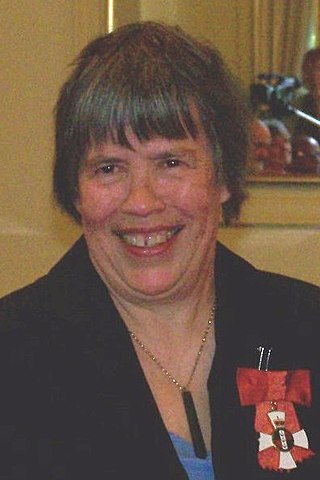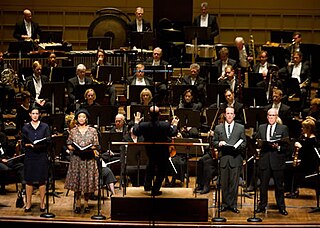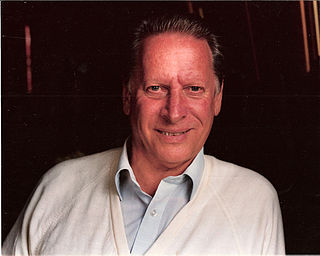John Drummond (born 1944, Lancaster, Lancashire) is a New Zealand musicologist, academic, and composer.
John Drummond (born 1944, Lancaster, Lancashire) is a New Zealand musicologist, academic, and composer.
Drummond graduated with a BA (Hons) and BMus from Leeds University before completing his PhD at Birmingham University. [1] He was Haywood Research Fellow at the University of Birmingham in 1969 and then lecturer in music there from 1970 to 1976. In 1976 he took up his appointment as Blair Professor of Music at the University of Otago a post he held until his retirement in 2014. From 2002 to 2006 he was Dean of the School of Language, Literature and Performing Arts at Otago, from 2006 to 2009 Associate Dean (Academic) in the Division of Humanities, and from 2010 to 2011 Humanities Ambassador for the University. [2] Drummond was a visiting professor at Leeds University in 1995 and in 2009 at the University of Washington School of Music, Queensland Conservatorium of Music, Malmo Conservatory of Music and Dartington College of Arts. He is currently emeritus professor of music at the University of Otago.
Drummond served as President of the New Zealand Society for Music Education (now Music Education New Zealand Aotearoa) from 1989 to 1999 and was awarded Life Membership. From 1997 to 1999 he was a member of the New Zealand Qualifications Authority Panel that devised Unit Standards in Music. From 2005 until its merger with the Royal Society Drummond was a member of the NZ Council for Humanities. In 2007-2008 he co-authored for the Ministry of Research, Science and Technology and the Ministry of Culture a report, Culture Matters, on funding for cultural activity in NZ.
In 1989 Drummond joined by invitation the Community Music Activity Commission of the International Society for Music Education and was its chair from 1993 to 1995. In 1997 he joined the ISME Board and was the first elected President in 1999, serving from 2001 to 2003. From 2002 to 2006 he was involved in the International Music Council’s ManyMusics Project, and from 2004 to 2010 regularly attended conferences of the Cultural Diversity in Music Education network. From 1998 to 2004 he was a member of the international strategic advisory group for the World Music Centre Project eventually located in Rotterdam, Holland. From 2009 to 2012 he led a research project on the Future of Western Opera for the Sustainable Futures for Music Cultures Project based at the Queensland Conservatorium of Music.
Drummond’s academic publications include Opera in Perspective (1980, J.M.Dent and Sons Ltd and the University of Minnesota Press), and many articles in music education publications. He is known for sharing provocative ideas. His series of broadcasts for Radio New Zealand in 1988 entitled Planetary Airs proposed that the pathway in contemporary music pioneered by Arnold Schoenberg and his disciples was an unimportant byway (a view now widely shared), while his May 2010 article in the International Journal for Music Education proposed that Western Art Music should be renamed Northwest Asian Court Music.
Drummond has been involved in opera for over fifty years. He has directed over 40 productions, edited 16 opera for performance, and translated 20 works. He is also New Zealand's most prolific opera composer and one of its most successful ones, having written nine one-act works (eight performed, three in multiple productions) and seven full-length works (all performed, one in multiple productions). His edition of William Shield's "Rosina" was published by Musica Britannica in 1998 and his reconstruction of Mozart's "Zaide" with Richard Rastall and Jane Oakshott (1988) was performed by City Opera Vancouver in 2016.
His full-length operas include
Happy Arcadia a setting of a play by W.S.Gilbert with music in imitation of Arthur Sullivan (1975)
Plague Upon Eyam (1983), libretto by Patrick Little
The Birds (1986), based upon Aristophanes' comedy, libretto by the composer
The Stars in Orion (1999), for Opera Otago, libretto by Patrick Little
Larnach (2007), for Opera Otago, libretto by the composer
A Schoolgirl Revolution (2011), commissioned by the Children's Opera of Prague, libretto by Jeremy Commons
War Hero (2017), for Opera Otago libretto by the composer
Three of these operas have New Zealand subjects. "The Stars in Orion" is based on the story of Bully Hayes at the Otago goldfields; "Larnach" tells the story of the man who built Larnach's Castle and who committed suicide in Parliament Buildings in Wellington; "War Hero" tells the story of World War 1 conscientious objector Archie Baxter.
His short operas include
The Hawkeyed Sentinel, (1969) from a comic play by Cervantes, libretto by the composer
Mr Polly at the Potwell Inn (2000), from H.G.Wells, for Sirius Opera, libretto by Jeremy Commons
A Beleaguered City (2002), for Sirius Opera, libretto by Jeremy Commons
Bridge to Somewhere (2002), for Otago Festival of the Arts, libretto by Nigel Eastgate
Marriage a la Mode (2004), from a Katherine Mansfield story, for Sirius Opera, libretto by Jeremy Commons
Impersonating Maurice(2005)/Dearest Maurice(2016), for Sirius Opera, libretto by Jeremy Commons
Mrs Windermere (2005), for Sirius Opera, libretto by Jeremy Commons
The Genteel Pigeons (2006), for Sirius Opera, libretto by Jeremy Commons
The Illustrious Stranger (2015), winner of the Opera Factory new opera contest, 2016. libretto by the composer

Dame Gillian Karawe Whitehead is a New Zealand composer. She is of Māori Ngāi Te Rangi descent. Her Māori heritage has been an important influence on her composing.

Jake Heggie is an American composer of opera, vocal, orchestral, and chamber music. He is best known for his operas and art songs as well as for his collaborations with internationally renowned performers and writers.

Steven Edward Stucky was a Pulitzer Prize-winning American composer.

Lazar "Larry" Sitsky is an Australian composer, pianist, and music educator and scholar. His long term legacy is still to be assessed, but through his work to date he has made a significant contribution to the Australian music tradition.

Hugo David Weisgall was an American composer and conductor, known chiefly for his opera and vocal music compositions.
Henri Léon Marie-Thérèse Pousseur was a Belgian classical composer, teacher, and music theorist.
Nigel Keay is a New Zealand composer. He has been a freelance musician since 1983 working as a composer, violist, and violin teacher. Nigel Keay has held the following composer residencies: Mozart Fellowship, University of Otago 1986 and 1987, Nelson School of Music 1988 and 89, Auckland Philharmonia Orchestra 1995.
Jack Hamilton Beeson was an American composer. He was known particularly for his operas, the best known of which are Lizzie Borden, Hello Out There!, and The Sweet Bye and Bye.

Edwin James Nairn Carr was a composer of classical music from New Zealand.

Anthony Damian Ritchie is a New Zealand composer and academic. He has been a freelance composer accepting commissions for works and in 2018 he became professor of composition at The University of Otago after 18 years of teaching composition. Since 2020 he has been head of Otago's School of Performing Arts, a three-year position. His works number over two hundred, and include symphonies, operas, concertos, choral works, chamber music and solo works.

Paul Mealor CLJ FLSW is a Welsh composer. A large proportion of his output is for chorus, both a cappella and accompanied. He came to wider notice when his motet Ubi Caritas et Amor was performed at the wedding of Prince William and Catherine Middleton in 2011. He later composed the song "Wherever You Are", which became the 2011 Christmas number one in the UK Singles Chart. He has also composed two operas, four symphonies, concerti and chamber music.

Hans-Jürgen von Bose is a German composer.
John Musto is an American composer and pianist. As a composer, he is active in opera, orchestral and chamber music, song, vocal ensemble, and solo piano works. As a pianist, he performs frequently as a soloist, alone and with orchestra, as a chamber musician, and with singers.

Jeremy Paul Axford Commons is a New Zealand opera historian, scholar, impresario and librettist. He is an authority on nineteenth-century Italian opera and has published major works on the composers Gaetano Donizetti and Nicola Vaccaj.
Odaline de la Martinez is a Cuban-American composer and conductor, currently residing in the UK. She is the artistic director of Lontano, a London-based contemporary music ensemble which she co-founded in 1976 with New Zealander flautist Ingrid Culliford, and was the first woman to conduct at the BBC Promenade Concerts in 1984. As well as frequent appearances as a guest conductor with leading orchestras throughout Great Britain, including all the BBC orchestras, she has conducted several leading ensembles around the world, including the Ensemble 2e2m in Paris; the New Zealand Symphony Orchestra; the Australian Youth Orchestra; the OFUNAM and the Camerata of the Americas in Mexico; and the Vancouver Chamber Orchestra. She is also known as a broadcaster for BBC Radio and Television and has recorded extensively for several labels.
Alison Margaret Bauld is an Australian writer and composer who lives and works in London, England.
David Griffiths is a composer, baritone and convener of the Conservatorium of Music at the University of Waikato. Griffiths has gained national and international recognition as a composer, opera singer and recital soloist. His choral compositions are particularly popular in the United States of America and have, in recent years, been recorded by several choirs while many works have been included on various record labels including Naxos Records, Kiwi Pacific and Atoll.

Julian Philips is a British composer. Philips' works have been performed at major music festivals, including The Proms, Tanglewood, Three Choirs Festival, at the Wigmore Hall, South Bank Centre and Berlin Philharmonic Chamber Music Hall and by international artists such as Gerald Finley, Dawn Upshaw, Sir Thomas Allen, the Vertavo String Quartet, the Tanglewood Festival Orchestra, the BBC orchestras and the Aurora Orchestra.

Haris Vrondos is a modern Greek composer.

Louise Durant Petherbridge, was a New Zealand actress, director, deviser, producer and lecturer.